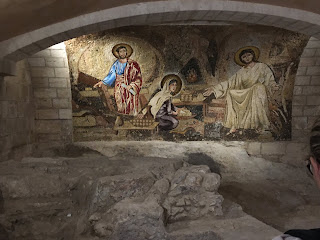May 1, 2020, The Solemnity of St. Joseph
Matthew 13:54-58
Jesus came to his native place and taught the people in their synagogue. They were astonished and said, “Where did this man get such wisdom and mighty deeds? Is he not the carpenter’s son? Is not his mother named Mary and his brothers James, Joseph, Simon, and Judas? Are not his sisters all with us? Where did this man get all this?” And they took offense at him. But Jesus said to them, “A prophet is not without honor except in his native place and in his own house.” And he did not work many mighty deeds there because of their lack of faith.
Normally in the course of things, the Gospel for today would be John 6, 52-59, continuing with the words of Jesus in which he describes himself as the Bread of Life, and as the Flesh which would be given up to save the world. However, the Church disposes that her ecclesiastical seasons be marked with the feasts of important saints, and today’s reading is for the Mass in honor of St. Joseph the Worker. John 6, 52-59 will be taken up here tomorrow in conjunction with tomorrow’s regular Gospel reading, which concludes chapter 6. This chapter is so essential for understanding Jesus and also ourselves as his followers, that to understand it we must examine all of it.
All the same, the reading here fits in well with what we considered yesterday in John 6. In fact, the crowd of John 6 echoes the words of the people of today’s reading: “The Jews therefore murmured at him, because he had said: I am the living bread which came down from heaven. And they said: Is not this Jesus, the son of Joseph, whose father and mother we know? How then does he say: I came down from heaven?” (John 6, 41-42). Quite inexplicably, these two verses are not included in the Mass readings. I have many questions of my own about the present lectionary, the book of the Mass readings, that was concocted and adopted in the mid 1960’s and lately revised slightly, and this is one of them.
The people of Nazareth ask a good question, “They were astonished and said, ‘Where did this man get such wisdom and mighty deeds?’ ” Similar questions were asked wherever Jesus went. As far back as when Jesus stayed behind in the temple at age twelve, we find him in the midst of “the doctors”, and all were amazed at his wisdom (cf. Luke 2: 46-47). We also hear the Pharisees and Scribes wondering where Jesus received his wisdom from since he had been educated in their schools. The people struggle to reconcile his ordinary appearance with his extraordinary words, works, and claims. They begin with his reputed father, Joseph: “Is he not the carpenter’s son?” In Judea, he will be hailed as the “son of David”, but the people of Nazareth are not interested in this. They may not even have been aware of his lineage. Instead, they refer to Joseph as “the carpenter”. This is a very odd way to speak about a neighbor. If you or I were sitting on our front porch and someone walked by and asked us if we knew where the mailman lived, wouldn’t that sound strange, even if we knew that Tom Brown, two houses down, worked as a mailman? The people of Nazareth almost give the impression that they do not want to speak Joseph’s name. They do use Mary’s name, but not that of her husband. Or was there something wrong with being a carpenter, as was the case with being a tax collector?
Now, English translations render the Greek “teknon” as carpenter, but the proper word for carpenter in Greek is “xylourgos”. “Teknon” can mean carpenter, but also mason, craftsman, builder, or even teacher. When the people call Jesus the “son of the carpenter”, they spoke better than they knew, for the Father of Jesus is not only the Craftsman of craftsmen, but also one who created the material from which he fashioned all things. Of course, we only have the Greek word to analyze, not the original Aramaic or Hebrew. It might have been “na-gar”, which means “one who works in wood”.
Whatever the case may be regarding how this righteous man Joseph was perceived by the townspeople, it pleased the Son of God to be thought of as his son, and as one who learned his father’s trade.
“Where did this man get such wisdom and mighty deeds?” Jesus does not stoop to answer their question with with long winded explanations that would not have been understood anyway. He simply allows the mystery to hang there, for now. This was not the time to rationalize but to accept, and the gathered folk are unwilling to do this. The lack of faith on their part so limited their capacity for receiving grace that the Lord’s miracles in his home town are few. The Evangelists do not trouble to describe them. Perhaps this lack of appreciation of the Son reflects their reception of the work his stepfather had done: its skillful, unpretentious qualities would be unappreciated by a society that craves ostentation and empty special effects.
Let us imitate this quiet worker, St. Joseph, who set such an example for the Son placed in his charge, and perform our duties conscious that whoever else sees our labor, God most surely does.
Above is a photograph I took in October 2019 of a
fresco under the church dedicated to St. Joseph in
Nazareth, depicting the Holy Family in their
carpentry shop.
fresco under the church dedicated to St. Joseph in
Nazareth, depicting the Holy Family in their
carpentry shop.

No comments:
Post a Comment